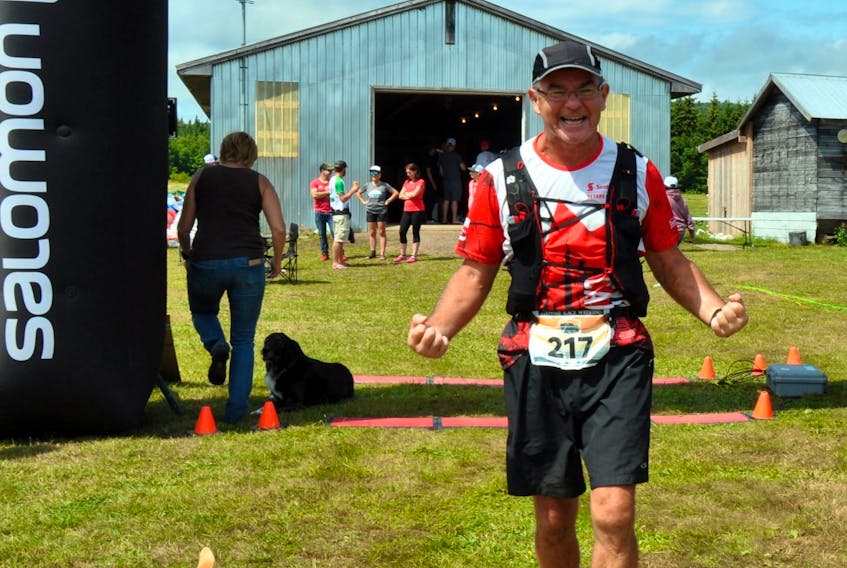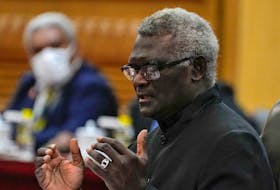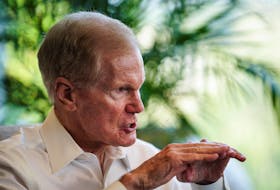GREENWOOD, N.S. — DID YOU KNOW?
Roy Banks finished the Capes 100 in 32 hours and five minutes. That was an interval of near-continuous running, day and night, with a few bursts of speed-hiking on rougher terrain, and a couple stops to dress his injuries. He did not sleep at any point.
----------------------------------------------------------------------------------
Roy Banks is a master of the marathon, a prolific runner of roads.
And now, he has another feather in his metaphorical hat as the comeback kid to trail running.
After attempting and failing a previous 100-mile trail run, the notion of being conquered by that event haunted him for years until he tried again at the Capes 100 on Aug. 17 – and emerged victorious.
“When you put time and commitment into something you fail at, it’s huge. I gave up on trail running for a couple of years, but it just kept gnawing at me,” Banks said. “Finishing the Capes 100 was my main goal this year. I was training for that for years.”
This year’s Capes 100 was the culmination of years of training and hundreds of miles of running to get in top shape for Banks.
In the process of training, Banks had plenty of runs on the side. While getting ready for the Capes 100, he found out he aged into a new category for the Boston Marathon and decided to run the Boston Qualifier.
“Those two training plans kind of overlapped,” Banks said, as if deciding in short order to train for two marathons, while already training for one, was a light decision.
But to Banks, who works out three to four times a week and logs the amount of running he does in tens of miles, it’s all in good fun and just another reason to lace up his running shoes.
HOW IT STARTED
Banks estimates he took his first strides in the sport about 15 to 18 years ago.
“I started running to get back into shape. I was trying to lose weight. It started off just as running around the neighbourhood, just short distances,” he said. “I just kept enjoying it and it became a stress relief – a lot of people get that kind of high when they go running.”
The rest was history, he noted, after he was invited to his first race. He quickly became integrated into the running community. He was instantly inspired by the group of people whose energy and passion for putting one foot in front of the other proved infectious.
PREP
Banks spent the first months of 2019 training to qualify for the Boston Marathon – all the while with his sights also set on Capes 100.
“I knew I was prepared this time,” Banks said. “I spent years preparing for it.”
That wasn’t all, either. While training for the Capes 100, Banks ran marathons across Eastern and Atlantic Canada, pounding the pavement in Fredericton, Ottawa, New Glasgow and Barrington.
On top of those, he also raced at several timed trail run events.
“I run a lot. I do it for fun and fitness,” Banks said. “I know that sounds kind of crazy to someone who doesn’t run marathons.”
Someone being able to do as many long-distance running events – whether on road or trail – as Banks does seems to be a superhuman feat. How does he avoid injuries?
He hits the weights.
Specifically, Banks said weight training was invaluable in the practice of avoiding injury.
“I do a lot of cross training, and mostly core strength training,” Banks said. “It helps to focus on muscle endurance and strength. Without doing that, I wouldn’t be able to run as much as I do.”
TRAIL VERSUS ROAD
While his Boston Marathon training and the four marathons he ran were helpful, trail running required Banks to switch gears from the fast-paced pavement pounding he does while road running, to something far more strategic.
Running road marathons, as opposed to trail running, is far more speed intensive.
“Training for a 100-mile run is a lot of time on your feet, and a lot of miles running,” Banks said. “Because it’s such a long distance, you don’t push yourself, pace-wise. Whereas, running the Boston Marathon Qualifier is a lot of faster running.
I would have to run a marathon faster than I normally run on my schedule to qualify for the Boston Marathon.”
Running long distance, on the trails, is not a mad dash, Banks noted. Trail running, in particular, is much more calculated planning and strategy than it is pure action.
“It’s an endurance run. When you’re practicing, you’re practicing how to run, practicing hydration and consuming 2-300 calories per hour,” Banks said.
For years, Banks noted he has been pushing himself further and further.
“I’m not a fast runner, he confessed. “I realized that a long time ago. I just wanted to keep going further and further.”
THE CAPE
With a chuckle, Banks admits, “terrain-wise, the Capes 100 is probably one of the first runs you can do for your first 100-miler.”
The Capes 100 challenged Banks’ ability to plan in advance for the slow-burn, strategic dynamic of long-distance trail running.
“You need to know the right places, and when to pick up speed. You need to really push it toward the end,” Banks said, describing some of his strategy.
Knowing where to slow down and speed up on the trial was crucial on the rugged route of the Capes 100, which by Banks’ own claim, was “about 99 per cent trail.”
Running on everything from gravel to well-worn ATV paths, Banks said there were some points where he was reduced to “a fast hike” because the terrain was so rough – particularly on the Cape Chignecto Park loop. This is not uncommon in such events.
MOTIVATION
The most crucial objective and singular focus for Banks throughout the race was the need to finish, staying ahead of cut-off times at each checkpoint.
“I told myself, ‘You’re not racing against other runners, you’re not running against the clock. You’re racing against your own time goals,’” Banks said. “I was in my own zone, and it was ‘Complete and finish, don’t pay attention to how many are ahead of you. Worry about where you are at.’”
One of the worst, and by his own estimation, inevitable moments of the Capes 100 was when one of the most aggravating injuries a long-distance runner can suffer happened. About 100 kms into the run, Banks said he started feeling blisters form.
“I did everything I could to prevent blisters and I still got them. I did up to 100K with no blisters,” he said.
With the first-aid kit he had handy, Banks did what he could to treat the blisters. He was fastidious about dressing them properly, noting that physical injury is one of the biggest contributors to a ‘DNF’ (did-not-finish).
VICTORY
Banks said that as he came within a few miles of the finish line, he knew his victory was inevitable.
“I was quite emotional as I finished,” Banks said. “Throughout the race I told myself I wasn’t going to quit, and a few kilometres out, it finally hits you that you literally are going to finish, after years of training.”
The kind of hours he puts into marathon training doesn’t just affect him.
“It’s your friends and family, because training becomes your whole life,” he said. “My wife’s everything revolves around me when I’m training.”
Banks can’t wait for another 100-miler. He said he’s going to shift the focus to achieving a better time, rather than just making sure he can weather it.
“What I gained from the Capes 100 is confidence in trail running, and confidence in myself,” Banks said. “If I work really hard, set a goal, work hard towards it – and train properly – that’s the right thing to do.”









